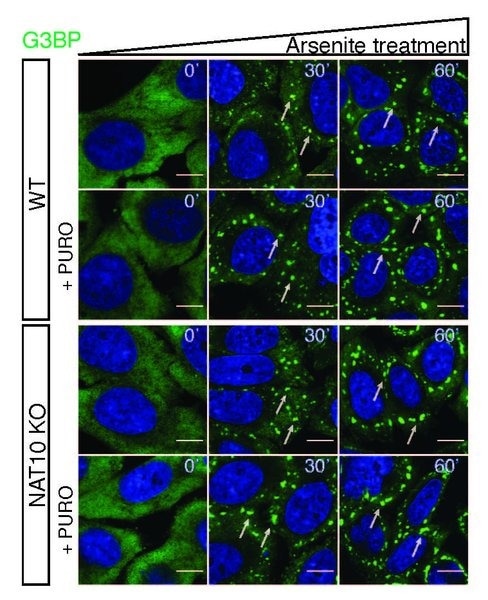A recent study by an international team of researchers has uncovered an interesting mechanism that human cells use for protection under stress. The study found that a minor genetic modification, referred to as ac4C, plays a crucial role in helping cells. This modification aids in the formation of stress granules, which act as protective units within the cells.
 Figure shows stress granule formation after oxidative stress in wild-type cells and cells depleted for the ac4C acetyltransferase enzyme NAT10. Image Credit: Pavel Kudin
Figure shows stress granule formation after oxidative stress in wild-type cells and cells depleted for the ac4C acetyltransferase enzyme NAT10. Image Credit: Pavel Kudin
These stress granules protect critical genetic instructions for the cell during stressful situations. The recently discovered information may clarify pertinent molecular pathways that may be targeted for the treatment of disease.
An essential component of the stress response is stress granules, which are made of proteins and non-translating mRNAs aggregating. Stress granules are well understood, although the mechanisms influencing their mRNA location are not fully understood.
Changes to mRNA can impact several processes, including translation, splicing, and transcript localization, as well as change the characteristics of the nucleobases. The researchers demonstrate that transcripts abundant in stress granules are associated with the RNA modification N4-acetylcytidine (ac4C) on mRNA and that transcripts localized with ac4C in stress granules are particularly translationally controlled.
Additionally, they demonstrate how ac4C on mRNA can influence the protein's localization to stress granules. Their findings contribute to the understanding of the molecular mechanisms underlying the development of stress granules by indicating that acetylation of mRNA affects the localization of both stress-sensitive transcripts and RNA-binding proteins to stress granules.
Stress granules are mRNA-protein complexes assembled without a membrane that results from mRNAs that become trapped during translation initiation. The production of stress granules depends on RNA-protein complexes, and the processes that foster their creation involve both traditional RNA-protein interactions and interactions involving intrinsically disordered protein regions.
Numerous functions for stress granules within the cell have been suggested, and it is well known from considerable research that they arise when translation initiation is restricted. Although several post-translational modifications can control the assembly and disassembly of stress granules, it is still unclear how RNA alterations affect these structures' creation, distribution, and function.
It has recently been demonstrated that the RNA modification N4-acetylcytidine (ac4C) is deposited on mRNA and controls translation efficiency. All kingdoms of life have conserved ac4C induced by various stressors. ac4C is less common than other RNA modifications on mRNA, and because it is challenging to map its function and occurrence on mRNA precisely and quantitatively, the topic has remained debatable.
The researchers demonstrated that ac4C is enriched in stress granules and that acetylated transcripts are primarily localized to stress granules in response to oxidative stress.
They also propose a model in which mRNA acetylation can influence mRNA localization to stress granules, partly by influencing mRNA's translational release from the ribosome. This model offers new insights into the role and effects of mRNA acetylation and the mechanism underlying RNA localization to stress granules.
The results will advance the knowledge of how cells respond to stress and the part RNA changes play in that response. Their research may assist clarify pertinent biological pathways that may be targeted in disease. Stress and RNA acetylation both have significance in disease.
Source:
Journal reference:
Kudrin, P., et al. (2024) N4-acetylcytidine (ac4C) promotes mRNA localization to stress granules. EMBO Reports. doi.org/10.1038/s44319-024-00098-6.